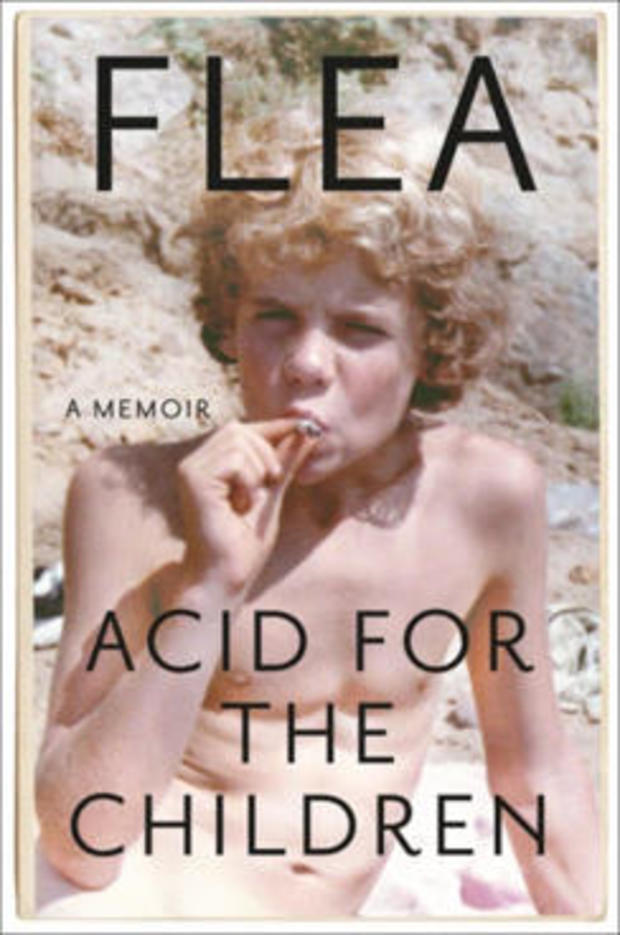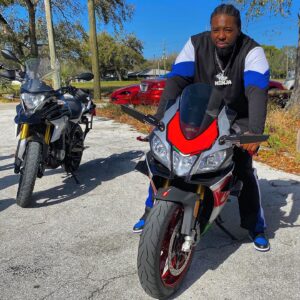
Rolling Stone ranked him the #2 bass player of all time. But Flea, one of the founding members of the Red Hot Chili Peppers, didn’t start out in rock ‘n’roll; he always dreamt of being a jazz musician.
In his book, “Acid For the Children,” Flea talks about how he fell in love with music, and his relationship with his band’s frontman, Anthony Kiedis.
By the lake in back of his L.A. home, Flea likes to practice bass lines. It’s a rare tranquil moment in what’s been a monumental year for the bass player.
In March, his band, the Red Hot Chili Peppers, played the pyramids in Egypt, and just last month he was married to designer Melody Ehsani. “I’ve been twiddling with my wedding ring for, like, four days now!” he said. “I found this incredible woman.”
Now, he’s published a memoir. “For so long, I didn’t want to write a book about myself, ’cause I thought it was an arrogant thing to do,” he told “CBS This Morning’ co-host Anthony Mason.
But “Acid For the Children” (Grand Central) is not a tale of rock star glory. It’s a reflection on a vulnerable childhood.
Grand Central
Mason asked if it was hard for him to write about being a “lonely kid.”
“The writing wasn’t hard. But when I would read it out loud, I would break down all the time,” Flea said.
“You know, I’m 57. I stopped doing drugs, drinking alcohol when I was about 30. And then I started feeling everything. And sometimes it was a river of pain.”
He was born Mike Balzary in Melbourne, Australia. In 1967 his father, who worked in customs for the government, was posted to New York, and took the family. They lived an ordinary life in the suburbs, until his mother left his dad and moved in with her guitar teacher: “We go to live with a junkie jazz musician who lives in his parents’ basement,” said Flea.
“That’s quite a change,” said Mason.
“It was a massive change.”
“As dysfunctional, imposing, and wounded as Walter was,” Flea writes of his future stepfather, “he was also my angel.”
One day, Walter Urban invited his jazz musician friends over to jam: “That day, it awakened something in me that, you know, changed my life forever,” Flea said, getting emotional.
“You still feel it now?”
“It was such a powerful moment, like, when I think about it. And it was the first time I saw it as a kid. I couldn’t believe it, man. I just was taken over by the spirit. They were magicians to me. It was magic!”
Mason said, “You’ve got a stepfather who causes enormous disturbance in your life.”
“He was terrifying.”
“But he also gives you this gift.”
“Yeah. But he was taking that pain and through, like, what is alchemy? Turning pain into something beautiful, which is what art’s about.”
In 1972, the family moved to L.A., where Flea would run wild. “When I was 12 years old, I’d go out ’til 4:00 or 5:00 in the morning, running the streets of Hollywood, looking for hustles, doing little crimes.”
But at school he discovered the trumpet: “Marching band, orchestra, the musical production band, jazz band, any band I could be in,” he said.
And in 7th grade he competed for the National Orchestra Award, performing Haydn’s trumpet concerto. He won. “And I got private lessons on the trumpet. And that was a big deal for me as a kid.”
At school, he would also find perhaps the most profound relationship of his life. It was 1976, and he was wrestling with a classmate. “And here comes up this kid. He’s got a crew cut, a hard buzz crew cut, and he’s so big and he’s muscle-ly, and he’s like, ‘Lay off him.’ And it was Anthony, and he had just moved to L.A. himself.”
“The universe gives us the ones we need,” Flea writes, “and the ones we deserve.” Anthony Kiedes would become the Chili Peppers’ frontman.
“We were both apart from things. Both outcasts in a way,” said Flea. “And our relationship is a strange one and a difficult one, and one that’s often antagonistic. We rub against each other the wrong ways. … I know that I love him.”
Mason said, “You say you’re opposite sides of the same coin – one’s concave, the other convex.”
“And I think that kind of has a lot to do with how our band ended up being, having, you know, the power that it does have.”
Flea on Red Hot Chili Peppers bandmate Anthony Kiedis
The nucleus of the original Chili Peppers would come together when the duo met Hillel Slovak. Flea recalled seeing Slovak driving down the street in his green Datsun 510, “an incredible car! Cranking stereo, man. I’ll never forget it. He was playing ‘La Villa Strangiato’ by Rush!”
Slovak, who had a band, was unhappy with his bass player, and said to Flea, “‘Maybe you should learn to play the bass.’ I felt just so, you know, loved in that moment.”
“Why did that make you feel so loved?” Mason asked.
“Because, you know, he picked me. I didn’t play the bass before. I knew that being in a rock band meant everything to him. His band was a sacred think to him. This is us, you know, like, and he invited me in.”
“And that meant everything to you?”
“It meant everything to me. I never would have played it had he not asked me. I never would have played the bass.”
Flea’s book ends just as the Chili Peppers begin. Will there be a sequel? “I’m on the fence about it,” he said.
Why? “I got records to make and tours to do and kids to raise and a wife to love. And, you know, there’s only so many hours in the day. But I do love sitting and writing. And it might happen.”
“Acid For the Children: A Memoir” by Flea (Grand Central), in Hardcover and eBook formats, available via Amazon.






